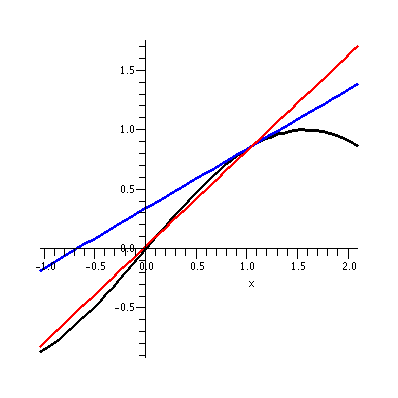
Instructor: John Perry
Office: Southern Hall, 317C
Office Hours: MWF 10-11a; TTh 1-2p
Office Phone: 601⋅266⋅5505
Email: john.perry@usm.edu
Instructor's web page: http://www.math.usm.edu/perry/
Class web page: http://www.math.usm.edu/perry/mat167Hfa13/
Class meeting time and locations: MWF 11-11⋅50a, SH 303

Text: Calculus for Scientists and Engineers, by Briggs, Cochran, and Gillett, 2013.
Course Description: Limits, continuity, derivatives and their applications including curve sketching and optimization.
Prerequisite: One of the following:
Grading: The semester grade will be determined by a weighted average, with the weights listed below. At any point during the semester, you may determine your standing by computing your grade. This can be done by multiplying the average for each category by the category's weight, then adding the product in each category. See me if you would like this shown to you.
| Tests | 40% of total |
| Homework quizzes | 20% of total |
| SAGE project | 10% of total |
| Attendance | 10% of total |
| Final Exam | 20% of total |
Grades are awarded according to the following tableaux:
| 100-90 A | 89.99-80 B | 79.99-70 C | 69.99-60 D | 59.99-0 F |
There is no curve.
Late Assignments: Any assignment turned in past the specified due date and time will receive a grade lowered by one letter grade for each school day late.
Attendance: I give a grade for your attendance (see the grading policy). Missing class, or reporting to class late, directly affects your grade. Carefully read the college policy on attendance. Students are responsible for all material missed when absent from class.
Makeup work: I do not give makeup tests/quizzes/etc. without an excused absence. If you must miss class, then you must also produce documentation of the reason for your absence. If you were sick, you can show me the receipt from the hospital or doctor; if you had a sports event, you can show me the schedule; if someone died, you can show me an obituary notice; if the tire on your car blew out, you can show me the receipt from the mechanic.
Homework: I expect you to do the homework. If you do not do the homework, you will probably fail this course. I will grade it by giving homework quizzes, in which you will have time sufficient to copy (not solve) problems from your notes.
A word about
tests: Tests are not multiple-choice.
Every test will consist of two parts: (1) a review of
the homework assignments, and (2) a problem that you have not seen in
class or in the homework. You will be able to solve the problem in part
2 based on what you learned in class. A good study guide for your tests
will therefore consist of (1) reviewing the homework I assigned, and
making sure you understand it, and (2) working problems in the chapter review that you haven't seen before.
Be advised that many students claim that my class is the first time any
instructor of mathematics has asked for definitions, proofs, and
intuitive explanations of why Calculus techniques are correct. I think
these are the easiest questions on the tests, so that won't change.
Tutoring and study groups: I encourage you to work together on homework assignments, to look at each other's solutions, and to explain answers to each other. This is not the same thing as copying each other's homework. You take the tests alone and without help, so if you cannot explain to your tutor, classmate, or teacher how to solve the problem, then you have not learned how to solve it, and you need to study it more (perhaps by visiting me, the professor).
My philosophy of instruction: I want you to pass this course.
You can learn this material,
and I am happy to assist any
student who genuinely needs help.
That said, you are the primary
agent of your learning.
I cannot learn the material for you; I
already learned it many, many years ago. It required a lot of work, and
sometimes it was difficult enough that I needed help from other people.
Today I
am a professor of mathematics. If I can
learn it, you can, too.
Final Exam: Monday, 9 December, 10⋅45a-1⋅15p
Language and behavior: I do not tolerate profanity or rude behavior. You are free to express any opinion you choose, but you must do so in a manner that conforms to the formal, respectful setting of a classroom lecture. Mathematicians value the ability to reason and to solve problems, not the ability to inflame passions or to express oneself colorfully.
Mobile phones: I expect you to turn your phone off once class begins, and to leave it off. If you absolutely must use the phone, please step out of class, take care of business, then return. If you use the phone in the class, I will ask you to leave. If you do not comply with this request, you will forfeit the next test. If you use the phone during a test, even as a calculator, you will forfeit the test.
Note: The last day to drop a full-semester course without academic penalty is Wednesday, 2 October.
|
ADA Syllabus Statement If a student has a disability that qualifies under the American with Disabilities Act (ADA) and requires accommodations, he/she should contact the Office for Disability Accommodations (ODA) for information on appropriate policies and procedures. Disabilities covered by ADA may include learning, psychiatric, physical disabilities, or chronic health disorders. Students can contact ODA if they are not certain whether a medical condition/disability qualifies.
The University of Southern Mississippi |